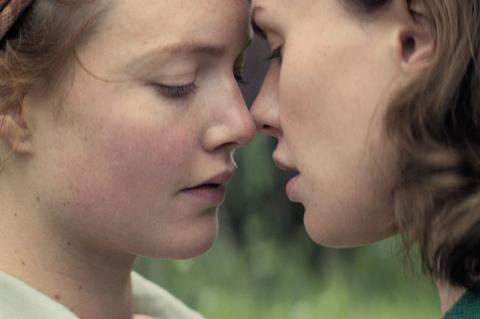A forbidden romance in 1950s rural Scotland

Dir Annabel Jankel. UK. 2018. 106 mins
The power of love is challenged by narrow-minds and deep-rooted prejudices in Tell It To The Bees. Annabel Jankel’s tasteful, touching adaptation of the Fiona Shaw novel offers a reminder of the forces that could destroy lives in less enlightened times. It may be too modest a tale for great commercial expectations but should find favour with upmarket romantics and lovers of carefully crafted literary period dramas.
Tell It To The Bees can seem a little too respectable for its own good but there are moments of pain and heartbreak that rise to the surface
The Scotland of 1952 is a drab, menacing place for anyone who dares to defy convention or stand out from the crowd. Children play in the streets in a manner familiar from the celebrated post-War photographs of Oscar Marzaroli. The clothes are as severe as some of the attitudes and the rain adds to the sense of oppression in a small town where respectability is everything.
Told through the innocent eyes of schoolboy Charlie (an impressive Gregor Selkirk), the film unfolds over one of those summers that change everything. Charlie’s English mother Lydia (Holliday Grainger) is a stranded outsider in this tight-knit community. Abandoned by her philandering husband Robert (Emun Elliott), mill worker Lydia is struggling to pay the rent and put food on the table.
Charlie is being bullied at school. His injuries require a visit to doctor Jean Markham (Anna Paquin) who has recently returned to the town. Charlie is fascinated by the bee colonies that Jean keeps and it is the start of a friendship that soon extends to include Lydia.
The bond between Lydia and Jean eventually blossoms into a romance that scandalises the town, incenses Lydia’s husband and puts them all in danger. There is a tender, convincing chemistry between the two leads. Holliday Grainger captures a sense of Lydia as a daring free-spirited woman more open to life’s possibilities than many of her generation. Anna Paquin’s Jean is, initially, a more reserved, starchy figure and you wonder how much of that can be attributed to the British accent she adopts. The range of the performance becomes more apparent as the glow of romance thaws Jean, and Paquin brings out her warmth and humour.
The subtle production design creates a sense that lives have been lived in these spaces. There is nothing that nudges you in the ribs about the period setting. Instead, there are telling contrasts between the modest dwelling of Lydia and the wealthier mansion and family possessions that mark Jean’s life. The cinematography is equally astute at serving the story, emphasising the claustrophobia of cramped little buildings and lives forced to exist in the shadows.
Tell It To The Bees can seem a little too respectable for its own good but there are moments of pain and heartbreak that rise to the surface, especially in a tense climax that puts the fates of several characters in the balance. A lesbian romance might be shocking to the gossipy, judgemental residents of this small town but it is an equally harsh place for a young white girl daring to find love with a multiracial man or a boy like Charlie whose sensitivity risks making him seem less of a “real” man.
Race, sexuality and masculinity are all touched on in a successful attempt to reflect the bigger picture of an era in which the slightest transgression could be met by the harshest of punishments.
Production companies: Reliance Entertainment, Productions 8, Archface Films, Talking A Line For A Walk, Riverstone Pictures, Cayenne Film Company and Motion Picture Capital
International sales: Film Constellation sales@filmconstellation.com
Producers: Daisy Allsop, Nick Hill, Annabel Jankel, Nik Bower, Laure Vaysse
Screenplay: Henrietta Ashworth, Jessica Ashworth based on the novel by Fiona Shaw
Production design: Andy Harris
Editing: Jon Harris, Maya Maffioli
Cinematography: Batosz Nalazek
Music: Claire M Singer
Main cast: Holliday Grainger, Anna Paquin, Gregor Selkirk, Kate Dickie







![The Brightest SunScreen[Courtesy HKIFF]](https://d1nslcd7m2225b.cloudfront.net/Pictures/274x183/3/5/0/1448350_thebrightestsunscreencourtesyhkiff_312678.jpg)















![The Brightest SunScreen[Courtesy HKIFF]](https://d1nslcd7m2225b.cloudfront.net/Pictures/100x67/3/5/0/1448350_thebrightestsunscreencourtesyhkiff_312678.jpg)
